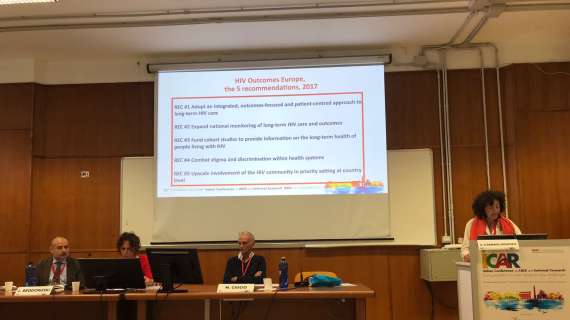The training needs of health personnel in Italian hospitals on HIV and the presence, or otherwise, of prejudices against people living with this infection. These are the themes of the research carried out as part of the HIV Outcomes Italia initiative – whose activities The Bridge Foundation supports – presented in Bari, at the “Aldo Moro” University, during the 15th edition of ICAR, the Italian Conference on AIDS and Antiviral Research, which saw the presence of over a thousand specialists and clinicians, young researchers, nurses, social workers, volunteers from patient associations.
HIV Outcomes is the initiative born at European level in 2016 to think about a new way of addressing the needs of HIV-positive people. The Italian spin-off, active since 2021, is represented by scientific managers Mario Cascio, European AIDS Treatment Group (EATG) and Antonella D’Arminio Monforte, of the University of Milan.
“Although more than 40 years have now passed since the beginning of this pandemic – said Mario Cascio – it clearly emerges that the stigma still exists and that this seems to be related to the lack of information on the subject. For example, almost 20% of the sample of our study, made up of more than 900 operators including OSS, nurses, midwives and doctors, believe that it is not possible for a woman living with HIV to give birth to a healthy child, while about a quarter of champion does not know what U=U means, i.e. Undetectable = Untransmittable”.
For Cascio it is necessary “to offer peer-to-peer and community interventions, focused on key populations, including transgender people, sex workers, people who inject drugs and people in prison, to address the discrimination suffered by those living with HIV. Furthermore, it is necessary to provide training that allows health professionals to detect and identify potential discriminatory cases. Finally, I believe that the EU must provide guidance to the Member States on actions aimed at combating stigmatization and discrimination”.
According to Antonella D’Arminio Monforte “it is necessary to adopt an integrated approach, based on long-term outcomes and centered on the patient. It is also useful to expand national monitoring of long-term management of people living with HIV and outcomes. It is also essential to fund cohort studies to provide information on the long-term health of these patients. We want to improve the quality of life of people living with HIV – underlined D’Arminio Monforte – and this means improving the sustainability of European healthcare systems, through the sharing of best practices and innovative approaches to treatment”.
During the lunch meeting “HIV Outcomes ITALIA – Beyond Viral Suppression from Europe to Italy and back” the objectives and projects in development of HIV Outcomes Italia were then explored, which in December 2022 presented the document “Policy Asks Enhancing long-term health and well-being among people living with HIV”, highlighting four key areas where action is needed to improve the health and well-being of people living with HIV, namely the prevention, treatment and management of co-morbidities, aging with HIV, measuring patient-reported outcomes (PROs) and monitoring health-related quality of life (HRQoL), and combating stigma and discrimination.
Finally, at the ICAR conference, The Bridge Foundation illustrated the research “Health and prevention in transgender people”, conducted at associations and clinical centers of infectious disease and then presented the poster “Aging and HIV: between gaps and perspectives”, on the theme of aging with HIV.
For the President of The Bridge Foundation, Rosaria Iardino, “HIV and AIDS in Italy must once again become debated topics and recipients of strategic health policy choices. The primary objective is to improve the quality of life of patients and their access to therapies. We need innovation and a change in the clinical approach to the infection and the pathologies connected to it”.
